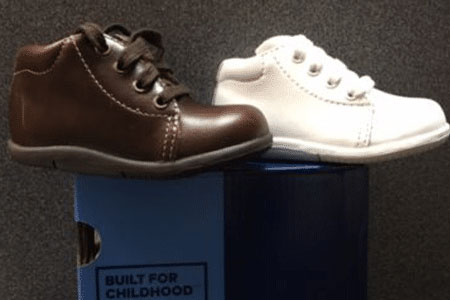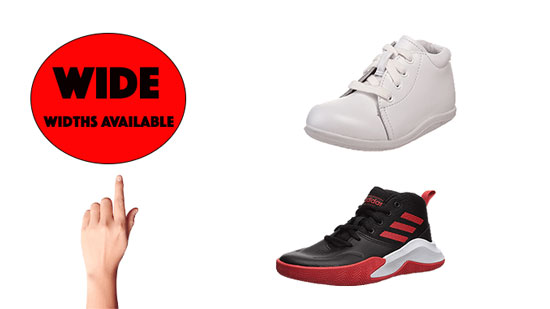Supportive Ankle Booties for Toddlers – Improve Foot Posture and Walking Gait

Is your toddler’s doctor recommending ankle booties that provide extra support for weak ankles or conditions like flat feet, pronation, or low muscle tone? The first seven years of a child’s life are often referred to as the “golden years of treatment opportunity.” As a passionate shoe fitter, I strive to help families find the perfect shoes for their children. Providing your toddler with supportive ankle booties has many benefits, but the most common ones are:
- Improve your toddler’s ankle stability
- Help treat your toddler’s low muscle tone
- Improve your toddler’s foot posture and walking gait
How Do Supportive Ankle Booties Look Like?
The booties that I recommend are the classic baby walkers that parents have used for over a century and they have a classical look. They are also available in white and black colors.
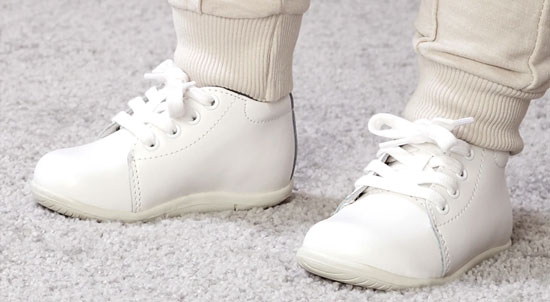
Not all ankle booties are created equal, and it’s crucial to choose the right pair for your toddler’s developing feet. The best ankle booties should offer a stable base and a firm heel counter to provide essential support, but they must also be lightweight and flexible. This balance ensures that your toddler can stay active without their feet or legs getting fatigued too quickly.
Supportive Ankle Booties: Why They Matter
Let me help you visualize the features that the ankle booties I recommend provide:
1. Supportive Outsoles: The booties I recommend feature a robust outsole designed to give your toddler a stable base of support, which is essential for improving foot posture and enhancing overall balance.
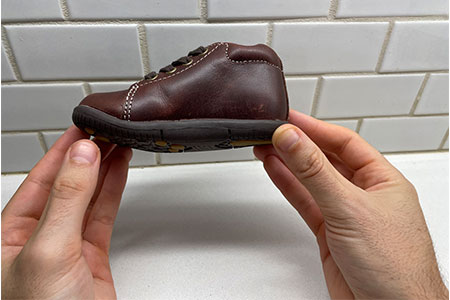
2. Firm Heel Counter: A firm heel counter is essential in ankle booties as it keeps the foot in the correct position. It provides the necessary support to the foot’s rear, ensuring stability during movement.
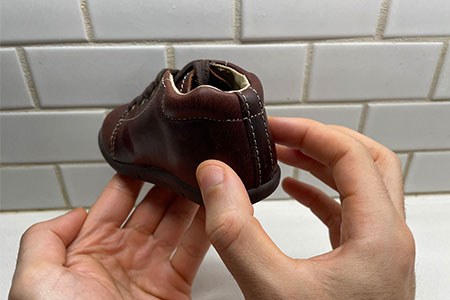
3. Lightweight and Flexible: While support is important, flexibility is equally crucial. Lightweight shoes reduce the strain on a toddler’s legs, allowing them to move freely.
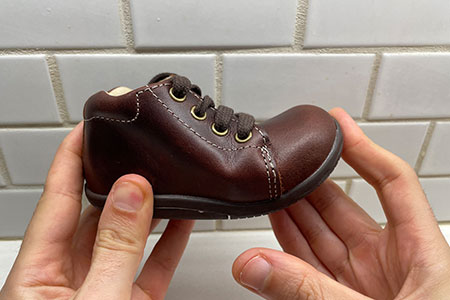
Over the years I have seen the positive impact that the correct types of shoes can have on a child’s life. Something so simple such as fitting your child in a pair of supportive shoes can improve your child’s walking gait and overall posture. Providing children with the correct types of shoes can be truly life-changing.
Should Toddlers Wear Supportive or Minimalist Shoes?
Toddlers who have foot conditions require supportive shoes to help treat and prevent the condition from getting worse. With that said, the goal of fitting children in supportive shoes is to provide structural support which is not going to take away from the musculature. You won’t be making your child’s muscles weak.
I like to make the analogy that supportive shoes are like glasses for your child’s feet. Can glasses cure your eyes? No, they make you see better and you can function normally. Supportive shoes are like glasses for your child’s feet!
The Impact of Supportive High-Top Booties: Before and After
Seeing is believing. Many parents are amazed at the difference supportive ankle booties can make in their child’s posture and balance.
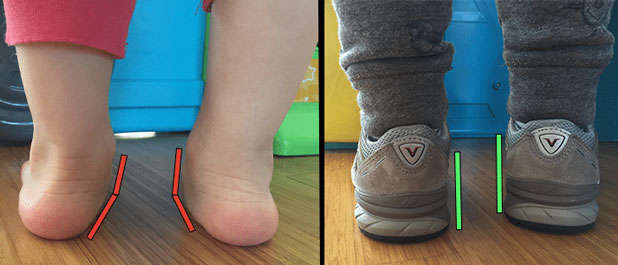
When it comes to selecting the best ankle boots for toddlers, consider brands known for their quality and focus on child foot health. Look for shoes that combine the key features of supportive outsoles, firm heel counters, and flexibility. Disclosure: Some of the links in this post are affiliate links, which means we may earn a small commission (at no extra cost to you) if you click through and make a purchase.
Supportive Ankle Booties for Toddlers
These booties are available in different widths such as medium (M), wide (W), and extra wide (XW), so make sure that you choose your toddler’s shoe width accordingly.
Shoe Style Elliott by Stride Rite
These toddler high-top shoes by Stride Rite offer excellent support and a comfortable fit.

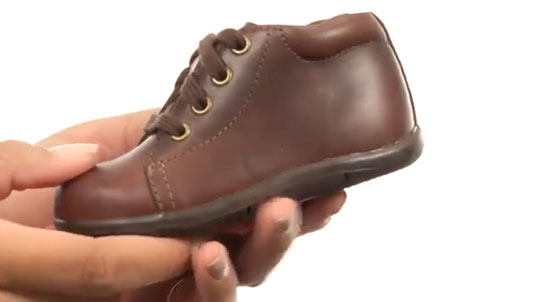
Key Features
- Available for toddlers
- You can order the shoe style SRT Elliot by Stride Rite on Amazon or Zappos
- Available in medium, wide, and extra wide widths
- I suggest that you get this shoe a whole size larger than your child’s current foot size
Hoops Mid 3.0 AC by Adidas
These stylish and supportive high-top sneakers for toddlers are designed to provide extra stability. The cushioned midsole and excellent ankle support makes it ideal for toddlers with foot conditions.
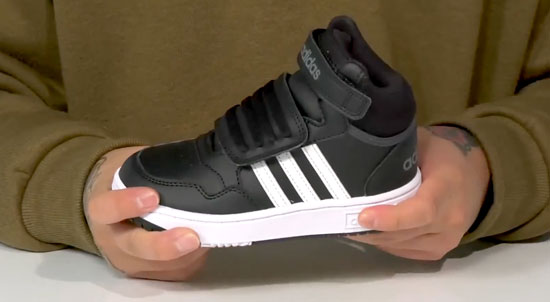
Key Features
- Order the shoe style Hoops Mid 3.0 by Adidas on Zappos or Amazon
- Fits medium and wide feet
- I suggest that you get this shoe a whole size larger than your toddler’s current foot size
Leatherette Derby by Josmo
These classic high-top shoes for toddlers are designed with firm heel counters for extra foot support. The stable base of support helps improve posture and balance, making it a great choice for toddlers with foot conditions.
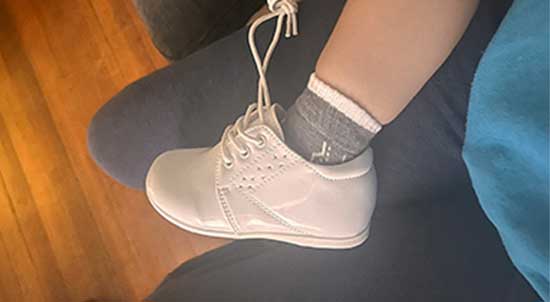
Key Features
- Order the shoe style Leatherette Derby by Josmo on Amazon
- Fits medium and wide feet
- Lace-up closure
- I suggest that you get this shoe a half size larger than your toddler’s current foot size
High Top Leather Shoe by Baby Deer
These high top toddler shoes feature a sturdy sole while allowing for natural foot movement. Ideal for toddlers who need extra stability, these shoes help promote healthy foot development without sacrificing style.
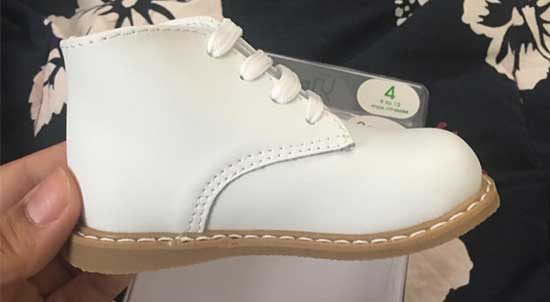
Key Features
- Order the shoe style Leatherette Derby by Josmo on Amazon
- Fits medium and wide feet
- 100% leather
- Lace-up closure
- I suggest that you get this shoe a half size larger than your toddler’s current foot size
Can These Booties Fit Toddlers with Wide or Extra Wide Feet?
Yes, these boots are designed to fit toddlers with wide feet, and even those with extra-wide feet in certain cases. It’s important to note that not all extra-wide feet are the same—some toddlers may also have high insteps alongside their wider feet. I’ve noticed that many toddlers tend to have wide or extra-wide feet, often due to the baby fat they carry during their early years. The good news is that this doesn’t mean their feet will stay wide forever! As they grow and develop, their feet may naturally narrow and become more proportionate.
I have spoken with several pediatric physical therapists who are frustrated about children not wearing their shoes in the correct size.
The Importance of Fitting Your Toddler’s Shoes Correctly
Footwear that is too tight can restrict movement and potentially hinder natural growth, while shoes that are too loose can cause instability and increase the risk of injury. The right fit is a delicate balance that ensures both support and freedom of movement.
Let’s use an automobile tire as an analogy as tire tread and shoe tread operate on the same principle. If the wheels on your car are out of alignment, your tires will wear excessively on one side and very little on the other. The result is a tire life shorter than it would be with proper wheel alignment and balance. Shoes fitted too long, too short, too narrow, or too wide, create a tread imbalance and a faulty wear pattern for the shoe itself. I created a virtual shoe fitting service that will help you retrieve your toddler’s exact shoe size from home.
How Fast Do Toddlers Outgrow Shoes?
I have noticed that toddlers can outgrow their shoes anywhere between three to four months, as long as they are provided with the correct amount of growing room to begin with.
How to Know When Your Toddler Needs New Shoes
The booties that I recommend come with a removable footbed that allows parents to easily visualize whether their toddler is ready for new shoes or not.

Does your toddler have a foot condition that requires supportive shoes? Have you discovered a particular shoe brand or style that has worked wonders for your little one’s feet? Share your recommendations in the comments below so other families can benefit from your insights and find the perfect shoe for their toddlers.

